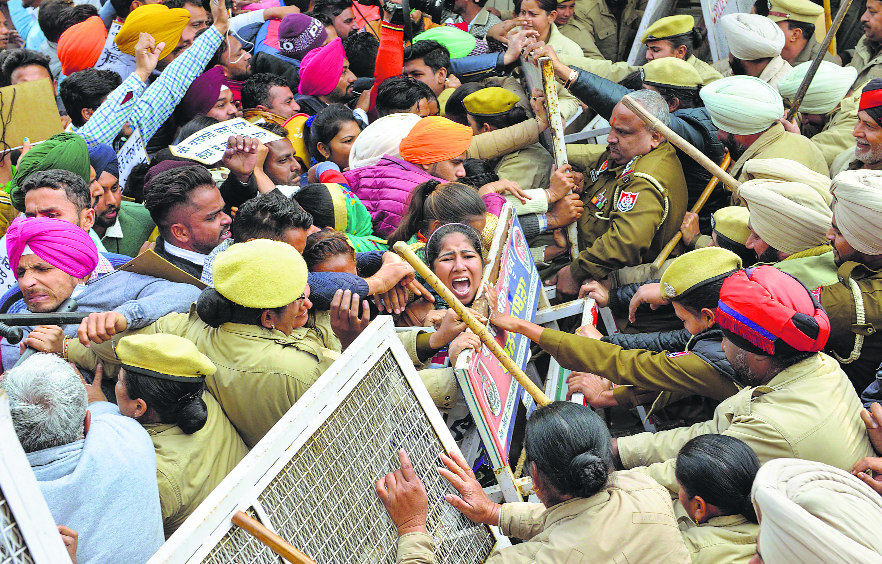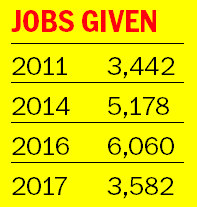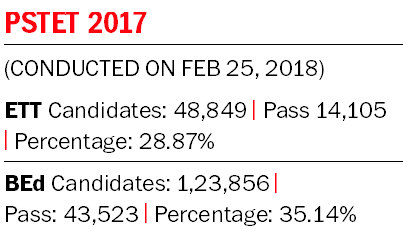
Sanjeev Singh Bariana in Chandigarh
I am not a coward,” says Phulbagh Singh, an ETT (Elementary Teacher Training)-TET (Teacher Eligibility Test) qualified aspiring teacher, who jumped into the Bhakra canal in Patiala on March 9 as a mark of protest. His grouse: denial of a job by the Punjab government despite having qualified to become a primary class teacher following a written test for 2017 he gave in February 2018.
Read also: ‘We have to pick best among those selected, can’t take all’
PSTET — NEVER A REGULAR AFFAIR
-
Following directions by the National Council for Teacher Education, the state had to start Punjab State Teacher Eligibility Test (PSTET), popularly known as TET, in July 2011.
-
In 2012, TET was not conducted. Aspirants went to court, state was directed to hold TET every year.
-
In 2013, state had to conduct it twice — for 2012 and 2013. It was conducted regularly for three years thereafter (2014-16).
-
In 2018, on court order, PSTET for 2017 was held. Successful candidates are yet to get jobs.
-
In February 2020, PSTET for 2018 was held, the result of which is yet to be declared.
“I am frustrated because I don’t have a job till date and will soon also be disqualified on the basis of my advancing age. My father has cancer. My mother had a leg amputated. My wife needs regular aid for her thyroid problem. The roof of my house is leaking... but, I, actually, cannot even die. I am not a coward,” he says. “Each one of us has a story of despair.”
Phulbagh represents the ETT-TET Qualified Unemployed Teachers Union. They qualified for the job for which they took the test, but are still jobless.
Clearing the ETT-TET qualifies you to teach primary classes (I to V) in government schools in the state. The minimum qualification for taking the TET is Plus Two and a two-year diploma ETT course. The government in 2018 upgraded the minimum qualification to graduation from Plus Two, but had to put it on hold till 2022 following protests. Those who qualify in the BEd TET (after having completed the Bachelor of Education degree) are eligible to teach students of classes up to Class X.
About 43,000 candidates had qualified in the BEd TET, 14,000 in ETT-TET.
Since 2011, the ETT-TET is being conducted by the State Council of Educational Research and Training (SCERT). Earlier, there was direct recruitment.
Teachers are paid Rs10,300 per month for the first three years (probation period) before they are regularised and get a salary of Rs43,000.
Members of the ETT-TET pass union have been protesting since September 4 last year in Sangrur, the constituency represented by Education Minister Vijay Inder Singla. They have been cane-charged at least six times. Those associated with the Unemployed BEd Teachers Union have also been sitting on dharna at an alternative site, in Sangrur, since September 8.
Qualification upgrade
To improve the overall merit of aspiring teachers, the state Cabinet in 2018 made an amendment that for fresh recruitment, the pass percentage in BA should be 55 per cent for general as well as reserved categories. Earlier, it was 45 per cent for reserved categories and 50 per cent for the general category. The decision had to be put on hold following demonstrations.
The vacancies for ETT-TET qualified teachers for primary classes are put at 12,000. For TET-qualified BEd teachers, the number is estimated at 15,000.
The key demand is “regularisation” of services of candidates who had cleared the TET for 2017 in 2018. “Regularisation” is a misnomer since what they are essentially seeking is jobs.
The Punjab government, on its part, claims to be changing the recruitment norms to get better qualified candidates. A senior official said, “We have introduced a qualifying test merely to check the teaching ability to suit our needs. We had also proposed to increase the qualifying merit of the written examination. What is wrong in that? Instead of allowing those with lower merit like in 2017 (with minimum of just 90 out of 150 marks), we are looking for better qualified teachers with higher merit.”
The obsession for government job
Randeep Sangatpura, press secretary of the TET Pass Unemployed BEd Teachers Union, says government jobs are preferred because of job security and better pay-scales. “Even if we are regularised after three years, we are assured of a permanent job. This is unlike private jobs in which teachers are paid peanuts and always kept on tenterhooks.”
He says that “as far as looking for other jobs is concerned, we are trained to be teachers and have a specialised avenue. Few among us look for an alternative avenue. Anyway, there is very limited opening in other spheres at the moment.”
In 2016, the state government introduced an additional ‘screening test’ for BEd-TET pass aspiring teachers. Now, the screening test has also been made mandatory for the ETT-TET pass teachers. Revocation of this additional screening is one of the major demands of the ETT-TET pass candidates.
The fear of losing out is also why members of the union do not want to re-appear. Those not averse to the idea want the maximum recruitment age increased from 37 to 42 years for the general category and from 42 to 47 for reserved category candidates.
A senior Education Department official says allowing an increase in age is unlikely. “This will set a wrong precedent. Even with lesser number of years of service, this category will qualify for all the post-retirement benefits, meaning a huge financial burden.” To this, a TET-qualified aspiring teacher counters: “Wasn’t TET a qualifying examination? There was no examination for 2018. Why should we be made to suffer? It is acceptable that the government makes amendments, but it has no right to ignore the merit the government set in the first place.”
Education Minister Vijay Inder Singla, meanwhile, denies the union charge that no fresh recruitment is being done.
“We have regularised at least 1,664 ETT posts recently, besides more than 2,100 BEd qualified posts. Now we have decreased the retirement age of teachers from 60 to 58. This will mean more than 3,000 posts from September onwards and we will be filling these.”
The protesters, however, say the figures for new recruitment are incorrect. “In case of ETT-qualified teachers, for example, the new recruitment was only about 1,000 and the remaining are old cases, including those who came through courts. A large number of posts have been filled only for the border areas.”

President of the ETT-TET union Deepak Kamboj, however, feels the actual number of teachers required in schools is very high. “There are many schools with just one or two teachers for 100 or more students.”
BEd union head Sukhwinder Dhilwan adds that “we are only asking the government to reverse its move towards privatisation. All TET-qualified candidates not given jobs should be given unemployment allowance. Teachers should be recruited as per the National Council for Teacher Education (NCTE) standards and not higher percentages as being planned.”
Ironically, aspiring teachers, once again, had to move court because the tests for 2018 and 2019 were not conducted. Therefore, in February this year, PSTET for 2018 was conducted, the result of which is yet to be declared. What will be the fate of these aspiring teachers?
Join Whatsapp Channel of The Tribune for latest updates.


























